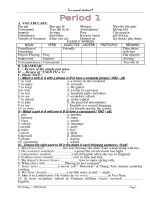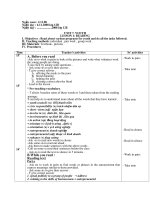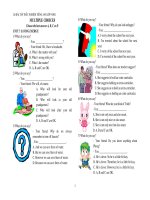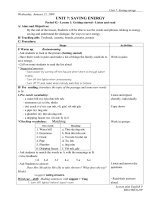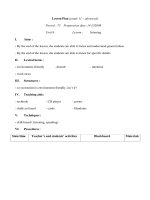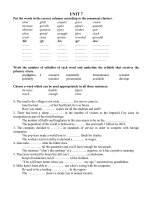Unit 7 / TA 9 Period 42-46
Bạn đang xem bản rút gọn của tài liệu. Xem và tải ngay bản đầy đủ của tài liệu tại đây (250.89 KB, 12 trang )
Unit 7: Saving energy
Wednesday, January 21, 2009
UNIT 7: SAVING ENERGY
Period 42 - Lesson 1: Getting started - Listen and read
A/ Aims and Objectives:
By the end of the lesson, Students will be able to use the words and phrases relating to energy
saving and understand the dialogue, the ways to save energy.
B/ Teaching aids: Textbook, cassette, boards, pictures, posters
C/ Procedure:
Steps Activities
I/ Warm up: Brainstorming
- Ask students to look at the picture (Getting started)
- Have them work in pairs and make a list of things the family could do to
save energy.
- Call on some students to read the list aloud.
* Suggested answers:
- Save water by turning off the faucet when there is enough water
supply.
- Turn off the lights when unnecessary.
- Turn off TV and radio when nobody watches or listens
Work in pairs
II/ Pre reading: Introduce the topic of the passage and some new words to
Ss.
1.Pre- teach vocabulary:
- a water bill (n): hóa đơn tiền nớc
- enormous (a): to lớn, nhiều
- (to) crack (v)/ (n): rạn nứt, vỡ, gãy/ vết nứt gãy
- a pipe (n): ống nớc
- a plumber (n): thợ sửa ống nớc
- a dripping faucet (n): vòi nớc bị rò rỉ
*Checking vocabulary: Matching
New words Meaning
1. Water bill
2. Enormous
3. Crack
4. Pipe
5. Plumber
6. Dripping faucet
a. Thợ sửa ống nớc
b. Hoá đơn tiền nớc
c. Vòi nớc bị nhỏ rọt
d. To, lớn
e. ống nớn
f. Vết nứt, gãy
- Ask students to match the words in A with the meanings in B.
- Give feedback:
1-b 2-d 3-f 4-e 5-a 6-c
- Ask Students to answer:
Does Mrs Mi advise Mrs Ha to take showers? What does she say?
Model:
I suggest taking showers.
Word cue drill: Making sentences with suggest + Ving
1. turn off/ lights/ before/ leave/ room
Listen and repeat
chorally, individually
Copy down
Work in groups.
Listen and answer the
questions
- Read their answers
aloud.
Lesson plan English 9
BTG/THCS DP
Unit 7: Saving energy
2. get a plumber/ make sure there/ no cracks in the pipes.
3. repair dripping faucets.
4. take/ showers/ instead/ have/ baths.
- Call on Students to read their sentences aloud.
Copy down.
III/ While - reading
*Set the scene: “Mrs. Mi is talking to her neighbor, Mrs. Ha about the
water bill this month.”
- Ask Students to practice the dialogue with a partner.
- Call some pairs to practice in front of class, feedback on Ss
,
pronunciation
and intonation, then correct the mistakes if any.
- Have Students read the dialogue and decide the statements in the book
T/F.
- Correct the false ones.
- Get them to compare the answers with a friend
- Call on some Students to read their answers in class and explain their
choice.
Answers:
1.True
2. True
3. False Mrs Ha has not checked the pipes.
4. False sMrs Ha suggests taking showers.
5. True
- Have them copy.
- Read the dialogue and
do the exercise.
- Work in pairs
- Practice in class.
IV/ Post – reading: Mapped dialogue
- Write some words in the dialogue on the board.
Matter
Worried…… water bill ……
Reduce……
Plumber …… cracks
……………
- Ask Students to close the book and recall the dialogue base on the words
given.
- Call on some pairs to practice the conversation in class.
- Practice the dialogue
(pair work)
- Work in pairs
- Practice the dialogue in
class.
V/ Homework:
1. Summarize main point and copy in their notebooks
2. Do the exercises (1, 2) in the workbook.
- Listen and copy.
Lesson plan English 9
BTG/THCS DP
Unit 7: Saving energy
Tuesday, February 10, 2009
UNIT 7: SAVING ENERGY
Period 43 - Lesson 2: Speak + Language focus 3
A/ Aims and Objectives:
By the end of the lesson, Students will be able to use suggestions to suggest ways to save
energy through group discussion.
B/ Teaching aids: Textbook, Posters, pictures and boards …
C/ Procedure:
Steps Activities
I/ Warm up: Revision
- Expressions of making and responding to suggestions
- Lead in the new lesson.
II/ Pre speaking:
Introduce the topic of the speaking:
1. Review the ways to make suggestions
Suggestion Response
I suggest + V- ing
I think we should
Shall we?
Why do not we?
How about + V- ing?
What about + V- ing?
Let
,
s
Ok
That is a good idea.
All right
no. I do not want to.
I prefer to
- Ask Students to make some sentences with the structures above.
2. Description:
- Have Students look at the pictures (A – H) and describe the pictures in
class.
- Call on Students to practice in class.
A. The faucet is on but nobody uses it.
B. Too much gas is use.
C. The fan is on, but nobody is in the room.
D. The air conditioner is on, but nobody is in he room.
E. The lights are on, but nobody is in the room.
F. The bath is overflowing.
G. They should not go to work by motorbike.
H. They should go by bus.
III/ While speaking: 1. Picture cue drill Speak a)
- Have Students look at expressions in the above tables and pictures in
the book to make suggestions about how to save energy.
+ Example:
A: I think we should turn off the faucet.
I suggest fixing the faucet.
- Call on some Students to read the suggestions aloud.
- Feedback and give suggested Answers:
B. I suggest turning down the gas.
C. I suggest turning off the fan.
D. I think we should turn off the air conditioner when no one is in.
E. Why do not we turn off the TV when no one watches it.
Lesson plan English 9
BTG/THCS DP
Unit 7: Saving energy
F. I think we should turn off the faucets.
G. I think we should not go to school by motorbike.
H. I suggest going to school by bus.
2. Speak b):
(Work out an Action Plan to save energy for your class.)
- Ask Students to work in groups of 4 Students, using the suggestions in
Speak a)
- Go around class and provide help if necessary.
Example:
S1: I think we should turn off all the lights before leaving the
class.
S2: That is a good idea
S 3: What about going to school by bus?
S 4: Great ! Let’s take the bus to school every day.
- Call on some groups to act out the discussion
- Give feedback
IV/ Post - speaking Language focus 3: Making suggestions
- Review some structures to make suggestions
Suggest + V- ing…
Suggest + that + S + should + V- infinitive …
- Ask Students to work in pairs to make suggestions, using the ideas in
the textbook.
Example:
A: What should we do to help poor people in the
neighborhood?
B: + I suggest collecting unused clothes
+ I suggest that we should collect unused clothes and
give them to the poor people in the neighborhood
- Call on some Students to read aloud their suggestions
Write
- Ask Students to write some sentences about saving energy in their
houses.
Example:
- I think we should turn off the TV set when we do not watch it.
- Why do not we go to school by bus.
V/ Homework: 1. Copy the completed sentences in their notebooks.
2. Let Students do the exercises (3,4) in their workbook.
Lesson plan English 9
BTG/THCS DP
Unit 7: Saving energy
Tuesday, February 10, 2009
UNIT 7: SAVING ENERGY
Period 44 - Lesson 3: Listen + Language focus 1, 2
A/ Aims and Objectives:
By the end of the lesson, Students will be able to understand and know how to do 2
common listening tasks: True or False and Gap filling, Get general knowledge about one
kind of alternative energy: solar energy.
B/ Teaching aids: Textbook, cassette, boards
C/ Procedure:
Steps Activities
I/ Warm up: Chatting
1. Is the sun important to our life?
2. In what way is it important to us?
3. Can it provide us with energy?
4. Do you know how we can receive its energy?
5. Do you know anything about solar energy?
- Lead to the new lesson.
II/ Pre listening:
- Introduce the topic of the listening and some new words to students.
1. Pre teach vocabulary:
- Solar (a): thuộc về mặt trời.
- Solar energy (n): năng lợng mặt trời
- Nuclear power (n): năng lợng hạt nhân
- Solar panel (n): tấm kim loại tiếp nhận năng lợng mặt trời
- advanced (a): tiên tiến, tiến bộ
- roof (n): máI nhà
- effective (a): có hiệu quả
* Checking vocabulary: Rub out and remember
2. True false statements predictions
- Let students read the statements in a) carefully and give their
predictions, then write them on the board.
III/ While listening 1. Prediction check:
- Play the tape two times and ask Students to check their predictions.
- Ask them to compare the answers with a friends.
- Feedback and give the correct answers:
Answer:
1. True
2. False Most of our electricity comes from the use of
coal, gas, oil or nuclear power.
2. False It is enough to provide power for total
population.
4. True
5. False in 2015
- Have them copy down
2. Gap filling:
Lesson plan English 9
BTG/THCS DP
